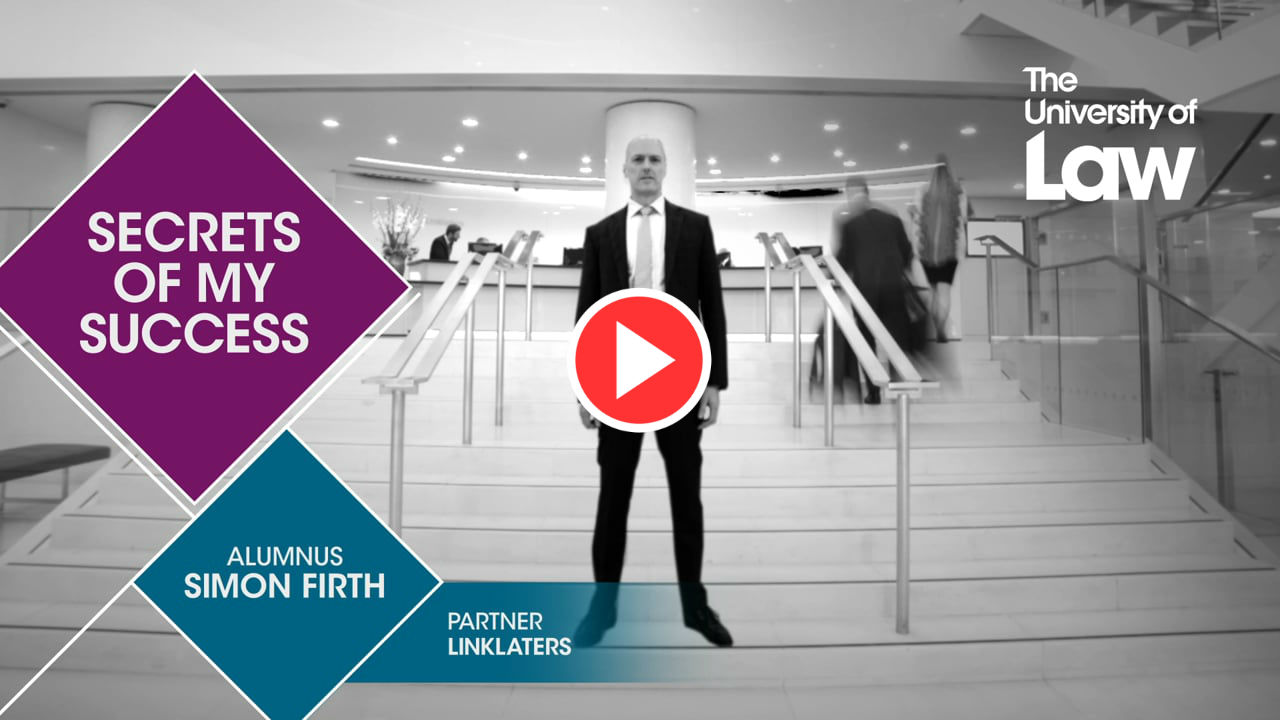- The University of Law (1986-1987), Law Society Finals (LPC equivalent)
- Christ Church College (1986), University of Oxford, MA Jurisprudence
- Partner at Linklaters
- Partner - Linklaters & Visiting Professor at The University of Law
- Associate - Linklaters
- Trainee Solicitor - Linklaters, 1987
- Undergrad Summer Vacation Scheme - Linklaters, 1985
Simon Firth is a partner with Linklaters LLP, a multinational organisation and member of the Magic Circle of elite British law firms. As a leading authority on issues affecting the derivatives markets, Simon’s advice is sought by clients across the globe. He joined the firm as a trainee in 1987 and during his career he’s advised on high profile issues such as the break-up of Lehman Brothers and Brexit.
Simon uses his expertise to teach our students as a Visiting Professor here at The University of Law. He’s one of more than 250 lecturers and visiting lecturers and professors who are qualified solicitors, barristers or judges with extensive, up-to-date experience in the legal sector. Here, Simon explains what it takes to become a Linklaters LLP partner.
I chose to study law because I was fascinated by the incredibly important role it plays in society. Whether they are lawyers or not, people confront legal issues all the time without necessarily having a particularly good understanding about how they are resolved. Even as a teenager, I was interested in being able to unlock the answers to day-to-day legal problems and understand the way law affects us.
As a second year law undergraduate, I told one of my lecturers that I was thinking of becoming a solicitor and he suggested a summer vacation scheme. He recommended Linklaters, so I was happy to agree. Vacation schemes in those days were in their infancy – there were no more than four of us in the whole of that summer.
If you can, try to do a vacation scheme, either at Linklaters or in another similar firm. As well as giving you an insight into how we operate, if you make a good impression it will stand you in good stead should you decide to apply.
After being offered a traineeship, I joined Linklaters in 1987 and enjoyed the work right from the start. I felt that private practice suited me and even at that early stage I knew I wanted to become a partner at the firm. I certainly didn’t intend to become a derivatives lawyer – I didn’t specialise in this area until I became a partner.
As a partner in our Derivatives and Structured Products Group, I advise clients on a whole range of issues affecting the derivatives market. Much of it involves contractual interpretation, as the contracts are very complicated and it is not always clear what they mean. More recently, clients have needed a lot of advice about the regulation of the market. It is a fast-moving area and so you need to keep up-to-date with what is going on.
The qualities and skills you need to be successful in commercial law are intellectual ability, the vision to see the issues from the clients’ perspective and a willingness to provide a very high level of service. Other attributes are also important, such as working hard, understanding the market you are operating in and getting the detail absolutely right. If you would like to work in this area, keep an eye on the legal issues that affect the business world and think about why they are important.
I worked with a team of administrators on the break-up of Lehman Brothers, the financial services firm, which marked the beginning of the global financial crisis. It was fascinating not only to be at the centre of a major historical event but also to be able to see how legal concepts that had been developed in a relatively abstract field operated in a real world situation. Currently, I’m advising clients on issues related to Brexit, because there’s a significant risk that a large proportion of the derivatives market will move, over time, to one or more other jurisdictions.
The two people who inspired me most were Ralph Aldwinckle and Paul Nelson, the partners I worked most closely with as an associate. Both of them were excellent lawyers. I sat with Ralph for my first seat as a trainee and he effectively taught me how to give clear and practical legal advice. I was given an enormous amount of responsibility for a first-seat trainee, which I really enjoyed. Paul was someone with enormous energy. He was constantly buzzing with ideas and was the driving force of the firm’s first regulatory practice.
My proudest moment came when my textbook, Derivatives Law and Practice, was published in 2003. Now running at about 1,300 pages it was quite an undertaking, not least because I wrote it in my spare time. I occasionally wondered whether I had bitten off more than I could chew but I eventually managed to do it.
I enjoy teaching as a Visiting Professor at ULaw because it allows me to meet students who are at the start of their legal careers. I love trying to explain some of the principles of the subject I am covering. ULaw has a very practical approach in preparing students for legal practice. That means trainees can be effective from the moment they start their training contract, which is better from the firm’s perspective but it also make the job more interesting for the trainee.
Find out how you too can set yourself up for success by coming to one of our Open Days.
Our Alumni Profiles
If you enjoyed this article, why not check out some more of our alumni profiles?
See more
